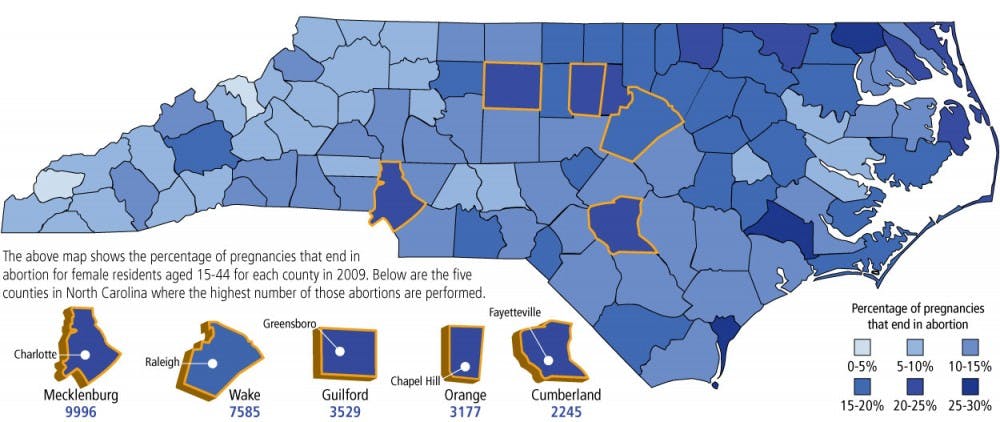Caitlin Borgmann, a law professor at The City University of New York School of Law who has testified on reproductive rights before state legislatures, said doctors and legal experts have found no evidence of long-term psychological damage as a result of abortion, and said first trimester abortions are “safer than a shot of penicillin.”
“There is evidence that these (‘right to know’) laws are motivated not by a desire to give more information, but by a desire to decrease abortion,” Borgmann said. “We need to recognize these laws for what they are.”
She noted that these laws often have strong moral and political undertones.
“There’s nothing wrong about giving women medical information,” Borgmann said. “But there is something wrong with giving them misleading information that steers them toward a decision that the state wants. And it’s even worse when it’s under the guise of medical advice.”
Abortion in NC
Orange County accounted for more than 3,000 of the 30,596 abortions performed in 2009 in the state.
Abortion in North Carolina must be performed by a licensed physician and is prohibited after 20 weeks unless the mother’s life or health is in danger. Parental consent is generally required for minors seeking abortions.
According to the N.C. State Center for Health Statistics, more than 26,000 residents underwent the procedure in 2009. Women also travel to North Carolina from other states to secure the procedure, which accounts for the more than 30,000 total. Data for 2010 has not yet been released.
Abortions were performed in 14 of the 100 counties in the state in 2009, with the most in Mecklenburg, Wake, Guilford, Orange and Cumberland counties. Eighty-six counties had no abortions performed. Many rural counties have no abortion provider and women travel to secure the procedure.
Legislative climate
Incoming state House Speaker Thom Tillis, a Republican from Mecklenburg County, joined 31 other GOP legislators in attending the N.C. Right to Life Prayer Breakfast in Raleigh this past Saturday. Tillis assured the group that passing anti-abortion legislation would be an important priority for lawmakers in the upcoming session.
Tillis later clarified that he does not want to infringe on a woman’s legal right to secure an abortion, but instead wants to make sure women make informed decisions.
To get the day's news and headlines in your inbox each morning, sign up for our email newsletters.
“The question that comes up in some cases is, do they really? Many of them make informed decisions. But not all of them. If they choose not to (have an abortion), maybe we’ve saved a life.”
“Bills like this have been introduced pretty much every year,” said Paige Johnson, vice president of public affairs for Planned Parenthood of Central North Carolina. However, they usually remained in committee or were defeated by Democrats in the N.C. Senate.
Democrats have controlled at least one of the two houses of the state legislature since Roe v. Wade was handed down in 1973.
“This year I do think it has a good shot,” Holt said. “Now that the Senate is controlled by Republicans, we have more confidence that the bill will be passed.”
Johnson said she is sure that Democratic Gov. Bev Perdue will veto any anti-abortion legislation.
If Perdue vetoed the legislation, the legislature would need three-fifths of both branches to override the measure. Republicans in the N.C. Senate have a veto-proof majority, and the N.C. House is only a few votes from being veto-proof.
Perdue could be reluctant to veto the legislation, as the Democrat will face a tough re-election battle in 2012. However, she voted for abortion rights in the past and has been endorsed by EMILY’s List, a group that works to elect female politicians who support abortion rights.
Abortion in Chapel Hill
In 2009, the N.C. Department of Health and Human Services recorded 431 pregnancies to women ages 18 to 24 in Orange County. Of these, 185 ended in abortion. Between 2005 and 2009, the percentages of pregnancies to Orange County women in that age group ending in abortion fluctuated between 35 and 43 percent.
Mary Covington, director for Campus Health Services, said they do not provide abortion services, but instead refer students to community resources if students decide to pursue the procedure.
Planned Parenthood, one of the nation’s leading abortion services providers, has a location in Chapel Hill where they perform abortions.
Johnson said the clinic serves many students from UNC, although private practices in the area can perform abortions as well. She said patients are first given a pregnancy test and then “options counseling” that is tailored to the individual and their specific situation.
Should they decide to pursue abortion, women are given an ultrasound and a sonogram for medical purposes and can view either one, Johnson said. They give “informed consent,” indicating that they understand the procedure.
The least expensive abortions typically cost about $350, but they can be more expensive depending on the stage of the pregnancy.
Insurance coverage of abortion has been a controversial debate within the state and at UNC. Johnson said that Planned Parenthood accepts health insurance, although not many women use it — most pay out-of-pocket.
“If she’s an average American woman she’ll be trying not to get pregnant for three decades. She’s likely to get pregnant by mistake. Half of pregnancies in the U.S. are unplanned,” Johnson said. “It’s a really common experience, but women just don’t talk about it.”
Staff writer Elise Young contributed reporting.
Contact the State & National editor at state@dailytarheel.com




